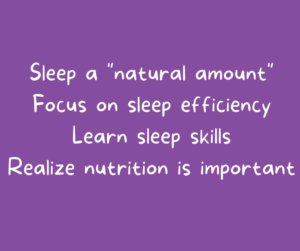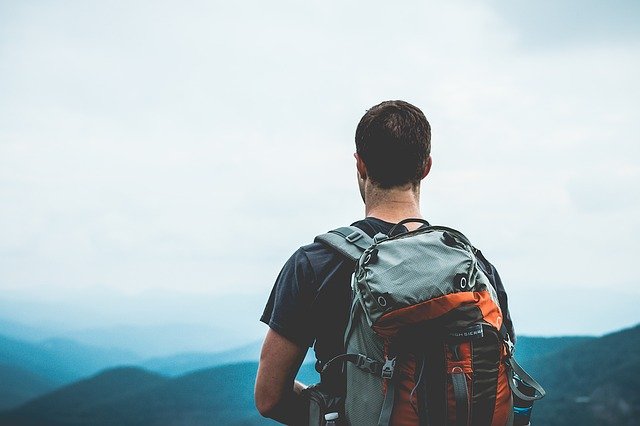Sleep takes up a major chunk of the day. That can conflict with your other goals. How can you sleep less yet maintain health?
I spend hours every week writing a sleep blog. I’m also longtime a sleep science enthusiast with a 25-year background in healthcare. I’ve both read and experimented a lot with sleep.
By using what I’ve come to understand about the process of sleeping, I put in 7 hours and 10 minutes a day in on sleeping per day on average; more some days, less others. Sometimes that’s split between a couple of sessions, sometimes not. I’ve been doing so for several years.
It’s enough for me. Yet I regularly read about how that’s not enough sleep. Whatever. The National Sleep Foundation recommends 7 to 9 hours a day for adults. My average is within their range. It’s the low side of normal and varies a little each day. If you’re someone who has a goal of sleeping the minimum, the low side of normal is probably a good goal.
As with any statistic, the amount of time a person needs to sleep could be put on a Bell curve. You’d have a median value and another value that’s one standard deviation and another that’s at two standard deviations. Two standard deviations from the medium would encompass 95 percent of cases. The five percent on both ends of the curve are outliers.
Such is the case with sleeping. You’ll read about people who supposedly sleep four or five hours because they’re so excited about their work or whatever. They say they have no ill effects or nothing. Somehow these “supermen and women” can function on this level of sleep.
Ignore these stories. They may or may not be true. Either way, they’re not you.
Further, ignore how much I sleep. I’m not you either. Like other things such as studying, people have been known to fudge their numbers when talking with other people about what they do. If you pay attention to it, you and your body can’t go wrong.
What really matters is your personal performance.
That’s such a good point, it deserves repeating. What matters is performance. The amount and quality of sleep you get dictates a lot of it.
Important note: If you don’t care about personal performance and long-term consequences, you can do anything you want.
That’s the key here. I’m writing this article for people who care about their personal performance and value their health. They’re my target audience. For them, there’s nothing like the feeling of kicking ass at whatever it is they do.
You’ve got a much better chance of “kicking ass” and general excellence if you make the time to sleep enough. If you sleep a couple of hours and then get up, take some meth or something, then stay up for 24 more, your ability to remember things, your coordination, and your mood, are all going to suffer. That’s not to even mention the long-term consequences of meth use. But you’ll be up, right? Your eyes will be open. You might even be checked in enough for someone.

Do I really need to say that if you take meth or rely too heavily on some other stimulant, that your long-term performance is going to suffer?
When you sleep, you’re not just lying there. Your body is performing some important maintenance work. This article is for people who want to sleep less and not suffer ill effects. These instructions are irrelevant for someone who cares for nothing more than having their eyes open and being present.
If you’ve really got to miss sleep to do something, say something life or death, then pop a bunch of stimulant pills of some kind. It doesn’t matter. It’s a life-or-death situation, right?
Righttt.
You can’t fully compensate for missed sleep.
So go ahead and shortchange yourself by taking some substances like the various energy drinks and drugs available.
Sleep your natural amount
Telling you to avoid these substances and simply go with the amount of sleep your body needs naturally seems like the frumpiest advice I can give. Yet, it’s responsible advice. There are too many important things going on while you sleep: memory consolidation; infection fighting; cellular repair; brain maintenance; hormone release, (like testosterone and serotonin). The list could go on.
Avoid substances that introduce an unnatural level of energy or suppress sleep reflexes. You might not like the result. Should you develop some problem, it’s harder to troubleshoot the cause the more complicated the blend of what you intake. Taking energy drinks is dumb. Your energy should come from simple, understandable food.
Marijuana suppresses REM sleep. Don’t take it to help you fall asleep. While many people consume marijuana to help them sleep, it’s actually terrible for it. The sleep they do get isn’t as restorative because of the problem with the deeper stages of sleep.
Having some hard liquor right before you turn in for the night is also a bad idea. That, too, affects your REM sleep.
The simple rule should be to be very careful about what you put in your body.
Coffee grown and processed in different areas has a mix of substances. It’s also been well studied. Coffee, especially prepared without any cream or sugar, has several health benefits. As with much in life, the key is moderation.
Strive to be as healthy as possible. Treat your body like you would a fine machine. The amount of sleep you need is going to go up and down. If you’re fighting off a cold or recovering from being on the road, you’re going to sleep longer. Generally, your body will let you know how long it needs.
I don’t worry about how much I sleep, though I do make it a priority just as I make the rest of the pillars of health a priority.
As with many of us, genetically I have a couple of strikes against me. If I was born fifty years before I was actually born, I’d be dead at the age I am now. I think that would have sucked. There’s so much I want to do still.
I’m not a health fanatic. I simply focus on doing the health-promoting things that will give me the biggest payback. Sleep is definitely one of those areas.
One of my heroes is my uncle who lived for 15 years longer than predicted by watching his diet, getting moderate exercise, and having a weekly diet cheat day at his favorite fast-food restaurants, McDonald’s and Arby’s.
Sleep efficiency
To decrease the raw amount you sleep, focus on sleep efficiency. Treat your body like a valuable, fine-tuned machine. Maintain it by eating a balanced diet of only the best, most wholesome food. Drink enough water. Avoid recreational drugs. Drink very minimal amounts of alcohol. Get enough exercise.
If you’re trying to decrease the amount you sleep safely, when you exercise, building muscle isn’t your priority. Exercise for the sake of activity. This helps you avoid problems like back pain, for example. Building muscle requires rest.
Sleep skills
Dedicate yourself to practicing sleep skills like prayer and meditation to help yourself fall asleep quickly.
Job #1: learn to quiet your mind. Keep your sleep area free from distractions. Make the main place you fall asleep a nice, pleasant place to be.
Embrace the need to sleep. Don’t let yourself get derailed from healthy habits for stupid reasons. You’re unlikely to solve anything by losing sleep. Instead, keep a dream journal and record your dreams. That will help you understand what your subconscious is ruminating about.
Most of us have to earn an income. Few of us are independently wealthy. The thing is, do you have to have a job that puts you on call and wakes you up in the middle of the night?
You’ve got to balance out a variety of concerns.
How often do they wake you up in the middle of the night?
How quickly can you fall back asleep?
Do you like the job? Do you get excited and happy at the thought of getting to go do it every day?
Realize the time you sleep isn’t lost if you develop the ability to recall and understand what your dreams are telling you. It’s actually part of life.
Follow up by understanding the experience of your mind and brain by that, I mean how your equipment (your body) perceives its interior and exterior. The reason for this is that by doing so you’ll expose and expunge any hang-ups or phobias that we all have. The mind spends a lot of time repairing itself from these emotional traumas. It’s not an accident that people who are dealing with depression sleep a lot.
If you become an expert in running your brain this can only help you when it comes to sleeping efficiently because of the relationship between sleep, emotion, and the brain, the place where the mind resides.
Lastly, another thing I recommend is looking into grounding. This is a tool used by elite athletes to speed recovery by reducing inflammation. You can also try sleeping cool, like with those sleep systems like Chilisleep.
For further reading:
The stop-overthinking-at-bedtime 2-step
Top 6 most underrated habits for weight management?
Dreams Provide a Sandbox Simulation Environment
Finding Balance Between Positive Thinking and Reality at Bedtime
James Cobb RN, MSN is an emergency nurse and the founder of the Dream Recovery System, a top sleep blog dedicated to sleep education.
Banner ads on the DRS include affiliate links. If you click on a link and make a purchase, we receive a portion of the sale price. This doesn’t change what we write.
